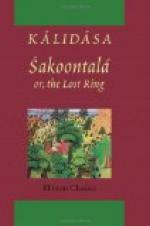In the present comparison, however, they are described as pure and unalloyed. With reference to the first four lines of this stanza, compare Catullus, Carmen Nuptiale, verse 39.
’Ut flos in septis secretus nascitur
hortis,
Ignotus pecori, nullo contusus aratro,
Quem mulcent aurae, firmat sol, educat
imber:
Multi illuum pueri, multae optavere puellae:
Idem quum tenui carptus defloruit ungui,
Nulli illum pueri, nallae optavere puellae:
Sic virgo, dum intacta manet,’ etc.
38. The sixth part of their grain.
According to Manu, a king might take a sixth part of liquids, flowers, roots, fruit, grass, etc.; but, even though dying with want, he was not to receive any tax from a Brahman learned in the Vedas.
39. A title only one degree removed from that of a Sage.
Dushyanta was a Rajarshi; that is, a man of the military class who had attained the rank of Royal Sage or Saint by the practice of religious austerities. The title of Royal or Imperial Sage was only one degree inferior to that of Sage. Compare note 27.
40. Chanted by inspired bards.
Or celestial minstrels, called Gandharvas. These beings were the musicians of Indra’s heaven, and their business was to amuse the inhabitants of Swarga by singing the praises of gods, saints, or heroes. Compare note 11.
41. In their fierce warfare with the powers of hell.
Indra and the other inferior gods (compare note 11) were for ever engaged in hostilities with their half-brothers, the demons called Daityas, who were the giants or Titans of Hindu mythology. On such occasions the gods seem to have depended very much upon the assistance they received from mortal heroes.
42. Evil demons are disturbing our sacrificial rites.
The religious rites and sacrifices of holy men were often disturbed by certain evil spirits or goblins called Rakshasas, who were the determined enemies of piety and devotion. No great sacrifice or religious ceremony was ever carried on without an attempt on the part of these demons to impede its celebration; and the most renowned saints found it necessary on such occasions to acknowledge their dependence on the strong arm of the military class, by seeking the aid of warriors and heroes. The inability of holy men, who had attained the utmost limit of spiritual power, to cope with the spirits of evil, and the superiority of physical force in this respect, is very remarkable.
43. Vishnu.
Vishnu, the Preserver, was one of the three gods of the Hindu Triad. He became incarnate in various forms for the good of mortals, and is the great enemy of the demons.
14 Like king Tri[s’]anku.




